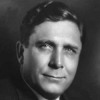Wendell Willkie

Wendell Willkie
Wendell Lewis Willkiewas an American lawyer, corporate executive, and the 1940 Republican candidate for president. Willkie appealed to many convention delegates as the Republican field's only interventionist: although the U.S. remained neutral prior to Pearl Harbor, he favored greater U.S. involvement in World War II to support Britain and other Allies. His Democratic opponent, incumbent President Franklin D. Roosevelt, won the 1940 election with roughly 55% of the popular vote to Willkie's roughly 45% of the popular vote. Willkie lost...
NationalityAmerican
ProfessionPolitician
Date of Birth18 February 1892
CityElwood, IN
CountryUnited States of America
In no direction that we turn do we find ease or comfort. If we are honest and if we have the will to win we find only danger, hard work and iron resolution.
The modern airplane creates a new geographic dimension ... the world is small, the world is one.
Freedom of the press is the staff of life, for any vital democracy.
There are no distant places any longer: the world is small and the world is one.
But we cannot just take this historical fact for granted. We must make it live.
Today it is becoming increasingly apparent to thoughtful Americans that we cannot fight the forces and ideas of imperialism abroad and maintain any form of imperialism at home. The war has done this to our thinking.
If we want to talk about freedom, we must mean freedom for others as well as ourselves, and we must mean freedom for everyone inside our frontiers as well as outside.
The constitution does not provide for first and second class citizens.
And political parties, overanxious for vote catching, become tolerant to intolerant groups.
Emancipation came to the colored race in America as a war measure. It was an act of military necessity. Manifestly it would have come without war, in the slower process of humanitarian reform and social enlightenment.
There exists in the world today a gigantic reservoir of good will toward us, the American people.
But if we had to trade with a Europe dominated by the present German trade policies, we might have to change our methods to some totalitarian form. This is a prospect that any lover of democracy must view with consternation.
What a man needs to get ahead is a powerful enemy.
I am not interested in the support of anybody who stands for any form of prejudice as to anybody's race or religion. . . . I have no place in my philosophy for such beliefs.